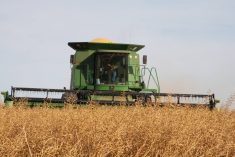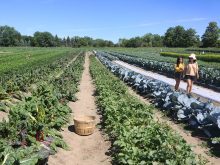opinion
To put it mildly, $7.2 billion is a lot of money. At a time when governments are supposedly scrutinizing all their activities to cut a paltry million here and there, there are many who would see it as an obscene amount for farm groups to request as compensation for loss of subsidized rail freight rates.
If, as expected, the next federal budget slashes social programs, there will be howls of protest from special-interest groups across the country.
If the federal government were to make such cuts and at the same time blithely announce its intention to spend an extra $7.2 billion on farmers, the public relations backlash could devastate all agricultural programs.
Read Also

Canada told trade crisis solutions in its hands
Canadians and Canadian exporters need to accept that the old rules of trade are over, and open access to the U.S. market may also be over, says the chief financial correspondent for CTV News.
A machiavellian federal government, in fact, might find such a clumsy announcement a devious but effective way to get rid of the entire burden of agricultural support.
The irony is that even $7.2 billion wouldn’t be full compensation for what farmers would be losing. It represents just 10 years of the former Crow Benefit rail subsidy, which was running at $720 million annually before cuts by the previous federal government.
Also, given the realities of lobbying, if that $7.2 billion were to be paid out, the benefits would be diluted to cover other groups in addition to the Western Canadian grain farmers who have to date been the beneficiaries.
Instead of the likely dilution, however, let’s assume Ottawa somehow manages to pull off the miracle of concentrating the money where it would do the most good. Depending on your philosophy, you might define that as paying it to the 100,000 farm families who most need it – or, conversely, to the most successful 100,000 farms.
In either case, the lump sum would come out to $72,000 per farm in this theoretical example. A more realistic example could be a tenth to a half of that, but let’s use the extreme hypothetical case for now.
That $72,000 might buy a new tractor, creating another job in some distant city. Meanwhile, the freight rates on that farm’s production would be doubled forever.
The farmer with the hypothetical $72,000 cheque (or perhaps the equivalent of a government junk bond?) would also take an immediate hit in asset value. Because the value of the transportation subsidy has been capitalized into land values over many generations, land prices and thus farmers’ net worth would drop.
Some cans of worms are better left unopened, and this may well be one of them. But if grain farmers are going to be compelled to get out their can-openers and diversify into becoming worm ranchers, they should at least be sure they get full compensation.
















